高中英语语法动词不定式和动名词做宾语.doc
接动词不定式(to do)做宾语的动词以及接动名词(doing)作宾语的动词

接动词不定式(to do)做宾语的动词
决心学会有希望( decidelearnwishhope)
同意计划莫假装(agreeplanpretend)
忘记拒绝会失望(forgetrefusefail)
准备设法来帮忙(preparetrymanagehelp)
提供请求负担起(offerbegafford)
记得阻止理应当(remember stopbe supposed)
接动名词(doing)作宾语的动词
【速记口诀】
Mrs.P Black missed a beefbag.(P·布莱克夫人丢了一个牛肉袋。
)
【妙语诠释】该句话中每个字母代表了一个动词或短语,这些动词要求后面跟动名词作宾语。
这些动词分别是:
m=mind介意,r=risk冒险,s=succeed in成功,p=practice练习,b=be busy忙于,l=look forward to期待,a=admit承认,c=can't help忍不住,k=keep on继续,m=miss错过,i=insist on坚持,s=suggest建议,s=stop停止,e=enjoy享受,d=delay取消,a=avoid阻止,b=be worth值得做,a=advise建议,g=give up放弃。
动词不定式和动名词作主语和宾语的用法
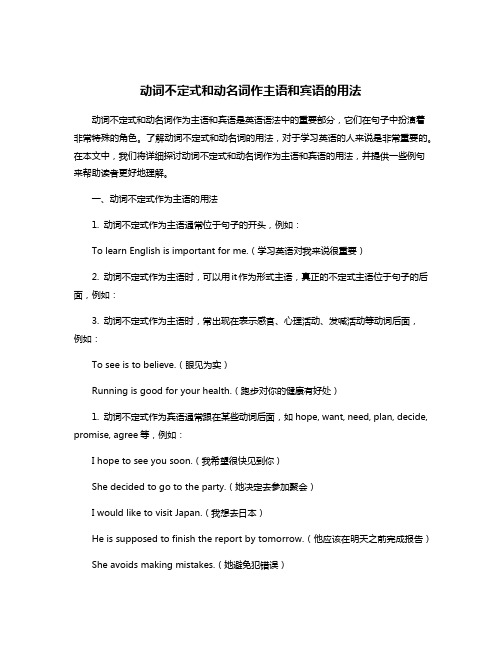
动词不定式和动名词作主语和宾语的用法
动词不定式和动名词作为主语和宾语是英语语法中的重要部分,它们在句子中扮演着非常特殊的角色。
了解动词不定式和动名词的用法,对于学习英语的人来说是非常重要的。
在本文中,我们将详细探讨动词不定式和动名词作为主语和宾语的用法,并提供一些例句来帮助读者更好地理解。
一、动词不定式作为主语的用法
1. 动词不定式作为主语通常位于句子的开头,例如:
To learn English is important for me.(学习英语对我来说很重要)
2. 动词不定式作为主语时,可以用it作为形式主语,真正的不定式主语位于句子的后面,例如:
3. 动词不定式作为主语时,常出现在表示感官、心理活动、发喊活动等动词后面,
例如:
To see is to believe.(眼见为实)
Running is good for your health.(跑步对你的健康有好处)
1. 动词不定式作为宾语通常跟在某些动词后面,如hope, want, need, plan, decide, promise, agree等,例如:
I hope to see you soon.(我希望很快见到你)
She decided to go to the party.(她决定去参加聚会)
I would like to visit Japan.(我想去日本)
He is supposed to finish the report by tomorrow.(他应该在明天之前完成报告)
She avoids making mistakes.(她避免犯错误)
The movie is worth watching.(这部电影值得一看)。
动词后接动词不定式/动名词作宾语用法小结
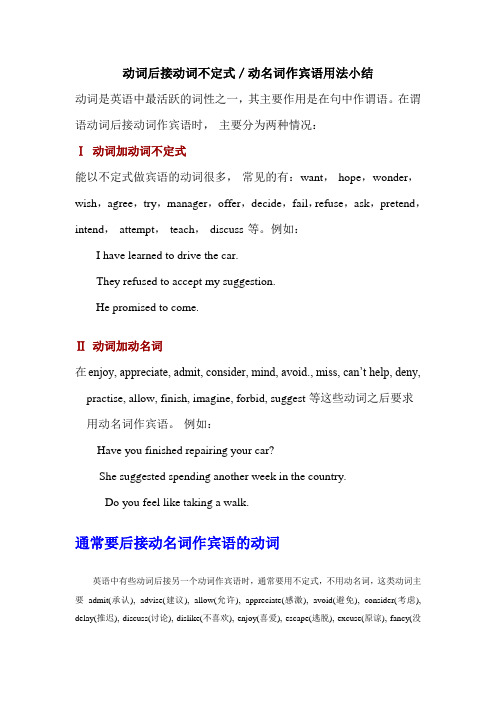
动词后接动词不定式/动名词作宾语用法小结动词是英语中最活跃的词性之一,其主要作用是在句中作谓语。
在谓语动词后接动词作宾语时,主要分为两种情况:Ⅰ动词加动词不定式能以不定式做宾语的动词很多,常见的有:want,hope,wonder,wish,agree,try,manager,offer,decide,fail,refuse,ask,pretend,intend,attempt,teach,discuss等。
例如:I have learned to drive the car.They refused to accept my suggestion.He promised to come.Ⅱ动词加动名词在enjoy, appreciate, admit, consider, mind, avoid., miss, can’t help, deny, practise, allow, finish, imagine, forbid, suggest等这些动词之后要求用动名词作宾语。
例如:Have you finished repairing your car?She suggested spending another week in the country.Do you feel like taking a walk.通常要后接动名词作宾语的动词英语中有些动词后接另一个动词作宾语时,通常要用不定式,不用动名词,这类动词主要admit(承认), advise(建议), allow(允许), appreciate(感激), avoid(避免), consider(考虑), delay(推迟), discuss(讨论), dislike(不喜欢), enjoy(喜爱), escape(逃脱), excuse(原谅), fancy(没想到), finish(完成), forbid(禁止), forgive(原谅), give up(放弃), imagine(想像), keep(保持), mention(提及), mind(介意), miss(没赶上), pardon(原谅), permit(允许), practise(练习), prevent(阻止), put off(推迟), report(报告), resist(忍住), risk(冒险), stop(停止), suggest(建议), understand(理解)等。
动词不定式和动名词作主语和宾语的用法
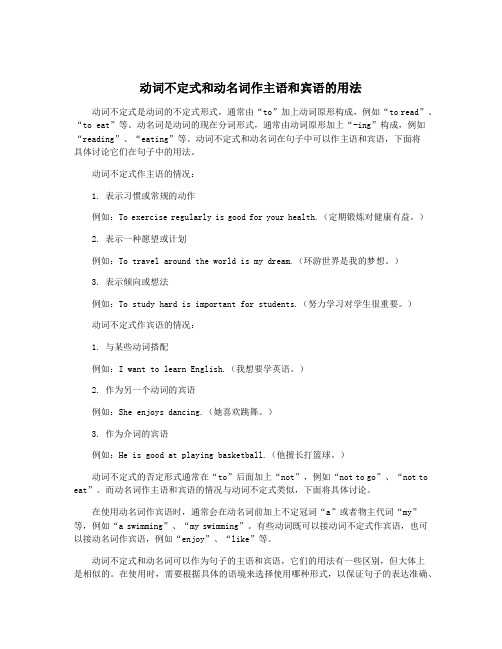
动词不定式和动名词作主语和宾语的用法动词不定式是动词的不定式形式,通常由“to”加上动词原形构成,例如“to read”、“to eat”等。
动名词是动词的现在分词形式,通常由动词原形加上“-ing”构成,例如“reading”、“eating”等。
动词不定式和动名词在句子中可以作主语和宾语,下面将具体讨论它们在句子中的用法。
动词不定式作主语的情况:1. 表示习惯或常规的动作例如:To exercise regularly is good for your health.(定期锻炼对健康有益。
)2. 表示一种愿望或计划例如:To travel around the world is my dream.(环游世界是我的梦想。
)3. 表示倾向或想法例如:To study hard is important for students.(努力学习对学生很重要。
)动词不定式作宾语的情况:1. 与某些动词搭配例如:I want to learn English.(我想要学英语。
)2. 作为另一个动词的宾语例如:She enjoys dancing.(她喜欢跳舞。
)3. 作为介词的宾语例如:He is good at playing basketball.(他擅长打篮球。
)动词不定式的否定形式通常在“to”后面加上“not”,例如“not to go”、“not to eat”。
而动名词作主语和宾语的情况与动词不定式类似,下面将具体讨论。
在使用动名词作宾语时,通常会在动名词前加上不定冠词“a”或者物主代词“my”等,例如“a swimming”、“my swimming”。
有些动词既可以接动词不定式作宾语,也可以接动名词作宾语,例如“enjoy”、“like”等。
动词不定式和动名词可以作为句子的主语和宾语,它们的用法有一些区别,但大体上是相似的。
在使用时,需要根据具体的语境来选择使用哪种形式,以保证句子的表达准确、清晰。
动词不定式和动名词作主语和宾语的用法

动词不定式和动名词作主语和宾语的用法动词不定式和动名词都可以作为句子的主语和宾语。
它们通常可以表示某个动作或状态,并且在句子中起着名词的作用。
下面将分别介绍动词不定式和动名词作主语和宾语的用法。
1. 动词不定式作主语和宾语动词不定式是由动词原形加上"to"构成的结构,常常可以作为主语和宾语。
动词不定式作主语时,常常表示一个具体的行为或动作,可以引出句子的主要内容。
例如:"To travel around the world" is my dream.("环游世界"是我的梦想)动词不定式作主语时,常常放在句子的开头或者结尾,有时也可能会出现在句子的中间。
动词不定式还可以表示时间、原因、目的、结果等。
例如:To finish the work early is important.(早点完成工作是很重要的)I went to the shop to buy some food.(我去商店是为了买一些食物)动词不定式也可以作为句子的宾语。
在这种情况下,动词不定式通常紧跟在及物动词后面,充当动词的宾语。
例如:She likes to listen to music.(她喜欢听音乐)常见的及物动词后跟不定式的有:like, want, hope, expect, need, plan, promise, decide等。
例如:I want to visit London next year.(我想明年去伦敦)She decided to study abroad.(她决定出国留学)He promised to help me with my homework.(他答应帮我做作业)。
不定式、动名词作宾语的英语动词词组

不定式、动名词作宾语的英语动词词组:英语单词搭配语法1. 用不定式和动名词做宾语,含义基本相同的动词有:begin,start,continue,cannot bear,hate,like,love,prefer,propose,regret.例如:to begin writing(to write)to start reading(to read)to prefer watching(to watch) televisionto love playing(to play) football对上述动词的应用注意以下三点:(1) 在like,hate,prefer等表示情感的动词后面,如果表示一般倾向,多用动名词做宾语,如果指具体某次行动,用不定式更多。
例如:I hate speaking before a big audience.I like reading books.I'd like to read that book.(2) 当谓语动词用进行时时,用不定式作宾语.例如:I am starting to work on my essay next week.(3) 在attempt,intend,plan等动词后面用不定式较普遍.例如:to attempt to do it by youselfto intend to pay the bill this monthto plan to take a holiday abroad2. 用不定式作宾语与用名词做宾语,含义有差别的动词(1) 动词remember,forget,regret的后面,若用不定式作宾语,不定式所表示的动作发生在上述谓语动词之后,若用动名词做宾语,动名词所表示的动作发生在上述谓语动词之前.例如:"remember +不定式" 表示"记住要去做某一件事""remmember +动名词或不定式的完成形式" 表示"记住过去做过的一件事".You must remember to write us when you get there.到那时记住给我们写信.Do you remember writing her last month?你还记得上个月给她写信的事吗?"forger +不定式" 表示"忘记要做某件事""forger +动名词" 表示"忘记过去做过的一件事"Don't forger to meet him when you get there.别忘了到了那里去会见他.I shall never forget meeting him during his inspection of our factory.我将不会忘记,在他视察我们厂时,我见到了他."regret +不定式" 表示"对尚未做,或正在做的事情的遗憾""regret +动名词" 表示"对过去做过的事情的遗憾"We regret to tell you that you can't stay here any longer.我们遗憾的通知你, 你不能再在这儿多呆了.They regretted ordering these books from abroad.向国外订购了这些书,他们很后悔.(2) 在动词try,cannot help,mean,stop,go on后,用不定式作宾语(有时是状语), 还是用动名词做宾语,其含义有明显的差别.例如:"try +不定式" 表示"设法去做某事""try +定名词" 表示"试一试某种方法""connot help +不定式" 表示"不能帮助做某事""cannot help + V-ing" 表示"禁不住""mean +不定式" 表示"打算,想要""mean +动名词" 表示"意味着,意思是""stop +不定式" 表示"停止原来做的事,开始做另一件事""stop +动名词" 表示"停止做某事""go on +不定式" 表示"放下原来做的,改做另一件事""go on + V-ing" 表示"继续做一直在做的事"。
不定式与动名词作宾语的区别

不定式与动名词作宾语的区别
1.动词不定式作宾语的时候,宾语的动作时间与谓语动作时间大多数情况下不是同一个时间,谓语时间一般在宾语时间之前;只有少数场合下谓语和宾语的时间是同一个时间。
此外,动词不定式作宾语突出动作性和动作的一次性。
例如:
He wants to go now.
他现在想走。
(want发生在go之前)
Would you like to have a cup of coffee?
你想来杯咖啡吗?
(like发生在havea cup of coffee之前,并且havea cup of coffee是一次性的)
We like to play chess.
我们喜欢下象棋。
(play chess在这里是指经常性的活动,而非一次性的活动)
2.动名词作宾语的时候,宾语动作的时间和谓语动作的时间是同步的,同时发生或者同时结束。
动名词还突出动作的经常性。
例如:
他已经完成写作。
√He has finished writing.
(finished和writing是同时结束的)
×He has finished to write.
(towrite发生在finished后面,这个讲不通) 许多男生喜欢唱歌。
√Many boys enjoy singing.
(enjoy和singing是同时发生的)
×Many boys enjoy to sing.
(enjoy发生在sing前面,这个不符合实际) 男生保持享受1分钟。
√The boy kept smiling for one minute.。
(完整版)高中英语语法动词不定式和动名词做宾语
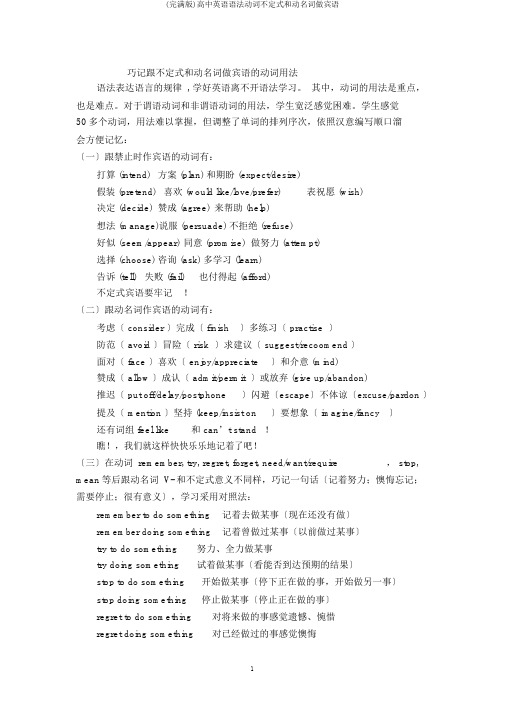
巧记跟不定式和动名词做宾语的动词用法语法表达语言的规律 , 学好英语离不开语法学习。
其中,动词的用法是重点,也是难点。
对于谓语动词和非谓语动词的用法,学生宽泛感觉困难。
学生感觉50多个动词,用法难以掌握,但调整了单词的排列序次,依照汉意编写顺口溜会方便记忆:〔一〕跟禁止时作宾语的动词有:打算 (intend)方案 (plan) 和期盼 (expect/desire)假装 (pretend)喜欢 (would like/love/prefer)表祝愿 (wish)决定 (decide)赞成 (agree)来帮助 (help)想法 (manage)说服 (persuade) 不拒绝 (refuse)好似 (seem/appear)同意 (promise) 做努力 (attempt)选择 (choose) 咨询 (ask) 多学习 (learn)告诉 (tell) 失败 (fail)也付得起 (afford)不定式宾语要牢记!〔二〕跟动名词作宾语的动词有:考虑〔 consider 〕完成〔 finish〕多练习〔 practise 〕防范〔 avoid 〕冒险〔 risk〕求建议〔 suggest/recoomend 〕面对〔 face 〕喜欢〔 enjoy/appreciate〕和介意 (mind)赞成〔 allow 〕成认〔 admit/permit 〕或放弃 (give up/abandon)推迟〔 put off/delay/postphone〕闪避〔escape〕不体谅〔excuse/pardon 〕提及〔 mention 〕坚持 (keep/insist on〕要想象〔 imagine/fancy〕还有词组 feel like和 can’t stand!瞧!,我们就这样快快乐乐地记着了吧!〔三〕在动词 remember, try, regret, forget, need/want/require, stop, mean等后跟动名词 V- 和不定式意义不同样,巧记一句话〔记着努力;懊悔忘记;需要停止;很有意义〕,学习采用对照法:remember to do something记着去做某事〔现在还没有做〕remember doing something记着曾做过某事〔以前做过某事〕try to do something努力、全力做某事try doing something试着做某事〔看能否到达预期的结果〕stop to do something开始做某事〔停下正在做的事,开始做另一事〕stop doing something停止做某事〔停止正在做的事〕regret to do something对将来做的事感觉遗憾、惋惜regret doing something对已经做过的事感觉懊悔mean to do something打算,想,意⋯mean doing something意味着want/require/need to be done某事需要做want/require/need doing 某事需要做 ( 名和主之有关系,如: The room needs cleaning/needs to be cleaned)can’t help to do sth.不能够帮助做某事can’t help doing sth.不由得做某事〔四〕牢在以下固定句式中,用V-ing 式:There is no point arguing further.再争下去没有意。
不定式或动名词作动词宾语的用法

不定式或动名词作动词宾语的用法在第十单元我们学习了不定式的句法功用,可以看出,不定式和动名词都可以作主语、宾语、表语、定语和补语。
作主语和表语时,动名词形式表示一般的、概念性的、时常的动作,而动词不定式常表示一时的、偶然的行为和动作。
如:Being a doctor is a good choice.当医生是不错的选择。
(对任何人、任何时候而言都是这样的)To be a good doctor is my dream.当个好医生是我的梦想。
(对个人而言,是个别情况)用动名词还是不定式作宾语,主要分为以下四种情况:(1)只可使用动名词作宾语的动词:enjoy,miss,practice,prefer,suggest,consider,appreciate,avoid,mind,imagine,finish ,admit,deny,delay,risk等。
只跟动名词的短语:feel like,stick to,devote to,pay attention to,be worth,be busy,can’t help,it is no use,b e used to (习惯于),look forward to,can’t stand等。
(2)只可使用不定式作宾语的动词:wish,hope,promise,expect,pretend,want,agree,refuse,prepare,manage,persuade, afford,offer,attempt,decide等。
只跟不定式的习语:would like/love to等。
(3)既可接动名词,又可接不定式作宾语的动词有:start,begin,continue,like,love,hate等,意思基本没有区别。
love,like和hate接动名词和不定式时,表示长久的、规律性的好恶用动名词,表示一时的、个别性的好恶常用不定式。
如:He hate eating fish from his childhood.他从小就不喜欢吃鱼。
动词不定式与动名词作宾语的区别
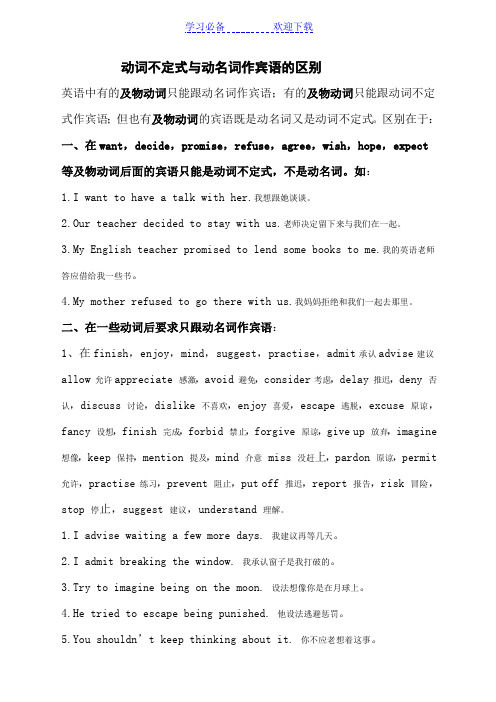
动词不定式与动名词作宾语的区别英语中有的及物动词只能跟动名词作宾语;有的及物动词只能跟动词不定式作宾语;但也有及物动词的宾语既是动名词又是动词不定式。
区别在于:一、在want,decide,promise,refuse,agree,wish,hope,expect等及物动词后面的宾语只能是动词不定式,不是动名词。
如:1.I want to have a talk with her.我想跟她谈谈。
2.Our teacher decided to stay with us.老师决定留下来与我们在一起。
3.My English teacher promised to lend some books to me.我的英语老师答应借给我一些书。
4.My mother refused to go there with us.我妈妈拒绝和我们一起去那里。
二、在一些动词后要求只跟动名词作宾语:1、在finish,enjoy,mind,suggest,practise,admit承认advise建议allow允许appreciate 感激,avoid避免,consider考虑,delay推迟,deny 否认,discuss 讨论,dislike 不喜欢,enjoy 喜爱,escape 逃脱,excuse 原谅,fancy 设想,finish 完成,forbid 禁止,forgive 原谅,give up 放弃,imagine 想像,keep 保持,mention 提及,mind 介意 miss 没赶上,pardon 原谅,permit 允许,practise练习,prevent 阻止,put off 推迟,report 报告,risk 冒险,stop 停止,suggest 建议,understand 理解。
1.I advise waiting a few more days. 我建议再等几天。
2.I admit breaking the window. 我承认窗子是我打破的。
动词不定式和动名词作宾语

动词不定式和动名词作宾语动词不定式和动名词均可在及物动词后面作宾语,但在使用过程中应注意以下几点:一、依照惯用法,agree,choose,decide,hope,fail,wish,refuse,expect,manage,plan,intend, pretend, promise, offer, afford, demand和arrange等及物动词后面常接动词不定式作宾语。例如:What did they decide to do?他们决定干什么?I hope to be back soon.我希望早点回家。二、依照惯用法, finish, enjoy, mind, keep, miss, avoid, consider, imagine, practise, delay,escape, excuse, allow, suggest等及物动词后面常接动名词作宾语。例如:We canfinish buildingthe bridge before the end of nextmonth.我们可以在下个月底之前建好这座桥。Would you mind opening the window?请您开一下窗户,好吗?三、依照惯用法, prefer,hate, begin,start, continue, cease等及物动词后面跟动词不定式与跟动名词作宾语,意义上没有多大的差别。例如:After the teacher left the classroom, the students began to do/doing their homework.老师离开教室后,学生们开始做作业。They continued to read/reading English.他们继续读英语。但在下列情况下,宜用动词不定式作宾语,而不用动名词。1. like, love, prefer, hate等与would或should连用时。例如:I’d prefer to stay home to watch TV.我宁可呆在家里看电视。2. begin, start, continue等本身用的是进行体时。例如:She was starting to do her homework.她开始做作业。3. begin, start, cease, continue的主语是物而不是人时。例如:It began/started to rain.天开始下雨。The ice ceased to melt(融化) in winter.冬季冰不再融化。4. begin等及物动词后接know, understand, realize等表示心理状态的动词。例如:They began to realize theimportance oflearning aforeignlanguage well.他们开始意识到学好一门外语的重要性。四、下列动词后面既可接动词不定式作宾语,也可接动名词作宾语,但两种结构的意义有区别:1. rember,forget, regret等后接动词不定式作宾语时,说明动词不定式表示的动作发生在后, rember等动词表示的动作发生在前;这些动词后接动名词作宾语时,说明动名词表示的动作发生在前, rember等动词表示的动作发生在后。试比较:Shetoldme togo andlock the door. She didn’t remberlocking the door after supper.她叫我去锁门,她不记得晚饭后锁过门了。Rember to turn off all the lights when you leave the classroom.你离开教室时,别忘记把所有的灯关掉。2. try, mean, can’t help,go on等动词后接动词不定式和动名词时,意义有明显的差别:1) try后面的动词不定式是作目的状语,tryto do sth意为“尽力做某事”; try 后面的动名词是作宾语, try doing sth意为“尝试做某事”。例如:He tried not to be late for the meeting.他争取开会不迟到。The soup is a little salty. Try adding some water to it.汤咸了点,加点水试试看。2)mean后面的动词不定式和动名词都是作宾语。meantodosth意为“打算(意图)做某事”; mean doing sth意为“意味着做某事”。例如:They didn’t mean to go an d help you.他们不打算去帮助你们。Hiswordsmeantgoingtohelpyouwithoutdelay.他的话意味着他将毫不迟疑地前去帮助你们。3) help后面的动词不定式和动名词都是作宾语。can’t help to do sth意为“不能帮忙做某事”; can’t help doing sth意为“禁不住去做某事,情不自禁地做某事”。例如:I’m sorry I can’t help to clean the room.对不起,我不能帮助打扫房间。They couldn’t helplaughingwhen theyheard the joke.听到这个笑话,他们不禁大笑起来。4) go on后面的动词不定式是作目的状语。go on to do sth意为“接下去做另一件事”;go on后面的动名词是作宾语。go on doing sth意为“继续做同一件事”。例如:They went on to do some exercises after reading the text.读完课文后,他们接着做练习。We went on doing our homework after he left.他走后我们继续做作业。五、need, want, require等动词后面跟动名词的主动形式和跟动词不定式的被动式,都表示被动意义。试比较:Your house needs repairing/to be repaired.你的房子需要维修。The problem requires solving/to be solved immediately.这个问题需要立即予以解决。六、stop之后的动名词为宾语, stop之后的动词不定式为目的状语。试比较:We stopped working.我们停止工作。We stopped to have a rest.我们停下来休息一下。When it began to rain, we stopped working to have a rest.天开始下雨,我们停止工作,休息一下。在英语中,某些动词后面只能跟动词不定式作直接宾语。
动词不定式和动名词做宾语的区别

一:.通常只能接不定式作宾语的动词:agree (同意); offer (提出); intend, plan (打算,计划); demand, ask (要求); promise (答应); help (帮忙); prepare (准备); decide (决定); refuse (拒绝); choose (选择,决定); wish,hope,want, expect (希望,想要); fail (不能;忘记); pretend (假装); manage (设法); determine (决心)afford(买得起,但付得起),arrange(安排,准备),aim(以..为目标,目的),beg(恳求,祈求),claim(声称),happen(碰巧,恰巧发生了某事),seem, hesitate(犹豫不决)。
同意提出做计划,要求答应来帮忙。
准备决定遭拒绝,敢于选择有希望。
不能做到莫假装,设法做成决心假。
恳求安排买得起。
恰巧似乎声称目的不犹豫。
1: He agreed to apologize to me.2. She offered to help me.3. We intend to get in touch with you through Email.4. He demands to be prized.5. She pretended not to see me when I came in.6. She demands to live alone.7. He promised to keep in touch with me.8. My sister helped me to finish / finish my homework.9. He prepared himself to accept failure.10. He decide to tidy my house.11. The hostess refused to invite her.12. He failed to pass the examination through carelessness.13. He chose not to go home until later.14. She expects to fail the exam.15. The cat manages to pat something invisible.16. They claim to have discovered a cure for the disease.17. We happened to be in the neighbourhood.18. He hesitated to take such a big risk.19. He seems (to be) quite happy.二; 通常只能接动名词做宾语的动词:admit,consider,suggest/advise,承认考虑建议avoid,delay/ put off,practise避免推迟练习allow/permit,finish,appreciate允许完成感激forbid,mind,imagine禁止介意想象escape, quit/give up,enjoy逃避放弃喜欢deny, risk, miss否认冒险错过can’t help, look forward to,禁不住盼望反对stick to, lead to, ,can’t stand,be accustomed to/ get/be used to,pay attention to坚持导致忍受习惯1. I appreciate having been given the opportunity to study abroad two years ago.She admitted having done wrong.2. I consider reading this series of books written by Luxun.3. The teacher suggested not violating classmates’ personal matters.4. He advises coming up to here..5. He always avoids talking to me.6. He delays / put off give a large amount of moner to me.7. We are practicing writing letters.8. We permit / allow you writing here.9. I have finished reading this book.10. The doctor forbids him smoking and drinking.11. Would you mind my opening the window?12. Can you imagine him becoming famous as an actor?13. He always escapes coming bake home.14. My father has quit smoking15. Do you enjoy teaching?16. He denied having seen these watches before.17. He risked getting caught in a storm yesterday.他昨天冒遭遇风暴之险。
不定式或动名词作动词宾语的用法

许多现在分词已经成为形容词,如amusing,annoying,astonishing,attracting,boring,disappointing,discouraging,encouraging,exciting,frightening,interesting,inspiring,inviting,pleasing,puzzling,shocking,surprising,tiring等,这些词都是由它们的同源动词加-ing变来的,都具有主动意义,译成“令人……的”,同普通形容词一样可以由副词修饰,也可以有比较等级。
start,begin,continue,like,love,hate等,意思基本没有区别。
love,like和hate接动名词和不定式时,表示长久的、规律性的好恶用动名词,表示一时的、个别性的好恶常用不定式。如:
He hateeatingfishfromhischildhood.
他从小就不喜欢吃鱼。
Myhairneedscutting.sworthreading.=The book is worthtoberead.
②不带to的不定式。
常用的有“十一个半动词”:五看二听一感觉,三个使役来帮助。即look,see,watch,notice,observe, listen,hear,feel,make,have,let,help。由于help也可使用带to的不定式,所以它算半个。
此外还有一些不带to的习语:had better do,wouldratherdo thando,whynot等。
③作定语时,动词不定式结构放在被修饰语的后面,作后置定语;动名词通常放在被修饰语之前,多表示被修饰语的用途。
现在分词
现在分词是动词词尾加-ing构成的。它们还保留着动词的特征,并带有形容词和副词的功能。因此,现在分词在句子中可以作定语、表语和状语。除此之外,现在分词还可以充当动词的宾补。及物动词的现在分词有主动意义,不及物动词的现在分词则表示动作正在进行。
动词不定式和动名词做宾语的区别

动词不定式和动名词做宾语的区别一、只能接动词不定式to do(作宾语)的动词:hope, expect, agree, promise, intend, plan, want, manage, decide, determine,attempt, pretend, choose,offer, refuse, fail 等。
例如:They all want to play football after class.二、1.只能接动词-ing形式(作宾语)的动词(短语):finish,mind ,admit ,allow ,appreciate ,avoid ,consider ,delay ,enjoy ,imagine ,keep ,miss ,permit practise , risk ,suggest 等。
例如:I admit breaking the window.2.有些短语动词和结构后面也要求跟动名词作宾语。
这样的短语动词常见的有:insist on, be worth,give up,put off,keep on,insist on,look forward to,can't help, be/get used to,spend...in , feel like 等3.在一些特别的句子结构中要求使用动名词:1.) “have problem (+in) + 动名词,2.) have difficulty in doing sth.,3.) be busy (in) + 动名词;4.) waste time (in) + 动名词;5.) There is no use + doing三、在remember,forget, regret, stop,mean 等及物动词后,既可接doing作宾语又可接to do作宾语,但意义不同。
动名词作主语(如果一个动词加上了ing变成了名词,那么这个词称动名词)动名词作主语有如下几种常见情况:1. 直接位于句首做主语。
动词不定式和动名词作主语和宾语的用法
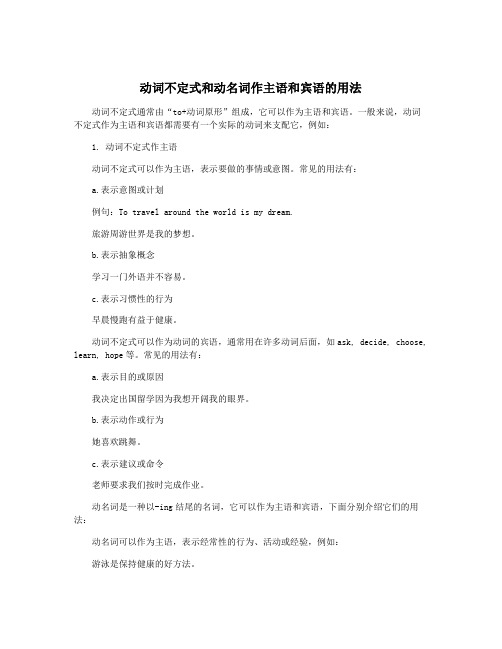
动词不定式和动名词作主语和宾语的用法
动词不定式通常由“to+动词原形”组成,它可以作为主语和宾语。
一般来说,动词
不定式作为主语和宾语都需要有一个实际的动词来支配它,例如:
1. 动词不定式作主语
动词不定式可以作为主语,表示要做的事情或意图。
常见的用法有:
a.表示意图或计划
例句:To travel around the world is my dream.
旅游周游世界是我的梦想。
b.表示抽象概念
学习一门外语并不容易。
c.表示习惯性的行为
早晨慢跑有益于健康。
动词不定式可以作为动词的宾语,通常用在许多动词后面,如ask, decide, choose, learn, hope等。
常见的用法有:
a.表示目的或原因
我决定出国留学因为我想开阔我的眼界。
b.表示动作或行为
她喜欢跳舞。
c.表示建议或命令
老师要求我们按时完成作业。
动名词是一种以-ing结尾的名词,它可以作为主语和宾语,下面分别介绍它们的用法:
动名词可以作为主语,表示经常性的行为、活动或经验,例如:
游泳是保持健康的好方法。
b. 表示经验或感受
例句:Reading is my hobby.
阅读是我的爱好。
2. 动名词作宾语
她喜欢在海里游泳。
我不介意等待你。
c.表示完成
我终于完成了我的故事写作。
总之,动词不定式和动名词在句子中可以作为主语和宾语,通过掌握它们各自的用法,可以更好地理解英语语法,提高英语表达能力。
动词不定式和动名词作主语和宾语的用法

动词不定式和动名词作主语和宾语的用法动词不定式和动名词是英语中两种常见的非谓语动词形式。
它们可以在句子中作主语或宾语,并具有一定的语法和用法规则。
下面将详细介绍动词不定式和动名词作主语和宾语的用法。
1. 动词不定式作主语动词不定式作主语时,常常用it作为形式主语,而将动词不定式放在后面。
例如: - It is important to learn English well.(学好英语很重要。
)- It takes time to do the homework.(做作业需要时间。
)- It is necessary to finish the project on time.(按时完成项目是必要的。
)动词不定式也可以直接作为主语,特别是当强调谁要做某事时。
例如:- To err is human.(犯错是人之常情。
)- To forgive is divine.(原谅是神圣的。
)动词不定式也可以作为某些连系动词后面的宾语补足语,如seem, appear, prove等。
例如:- The child seemed to be very happy.(这个孩子似乎很开心。
)- The weather proved to be fine.(天气结果很好。
)动名词也可以作复合宾语,即动名词和动词不定式共同作为宾语。
例如:- I like swimming and playing basketball.(我喜欢游泳和打篮球。
)- He enjoys singing and dancing.(他喜欢唱歌和跳舞。
)动词不定式和动名词作为主语和宾语的用法是非常常见的。
它们可以通过合理的语序和搭配来表达不同的意义和目的。
掌握这些用法和规则是学习英语的重要一步,希望以上的解释对您有所帮助。
动名词作宾语和动词不定式

动名词作宾语和动词不定式在学习英语过程中,我们经常会遇到动名词作宾语和动词不定式的构成和用法。
这两种语言结构在英语中非常常见,因此学习这两种语言结构的技巧十分重要。
首先,动名词作宾语通常用于表示某个动作或行为的实现,如:- I enjoy playing tennis. (我喜欢打网球)- She hates cleaning the house. (她讨厌打扫房子)- They suggested going to the beach. (他们建议去海滩)在上面的例句中,playing, cleaning, going都是动名词作宾语。
动名词作宾语通常用于动词后面,作为宾语出现。
值得注意的是,在某些情况下,动名词也可以作为主语、表语、介词宾语等。
其次,动词不定式通常用于表示某个动作或行为的将要发生,如:- I want to learn English. (我想学英语)- She needs to finish her homework. (她需要完成作业)- They plan to travel around the world. (他们计划周游世界)在上面的例句中,to learn, to finish, to travel都是动词不定式。
动词不定式通常用于动词后面,起到补充说明动作或行为将要发生的作用。
值得注意的是,在某些情况下,动词不定式也可以作为主语、表语、宾语等。
为了更好地掌握动名词和动词不定式的使用,我们需要注意以下几点:1. 动名词和动词不定式有时可以互相替换,但在某些情况下,只能使用其中一种形式。
因此,在学习过程中需要掌握使用场景和语境。
2. 有些动词只能使用动名词作宾语,而另一些动词只能使用动词不定式作宾语。
例如,enjoy, mind, avoid等动词后面通常使用动名词作宾语,而decide, agree, promise等动词后面通常使用动词不定式作宾语。
3. 动名词和动词不定式通常还会与介词搭配使用,如:- She is good at swimming. (她擅长游泳)- We are interested in learning new things. (我们对学习新事物感兴趣)- He is afraid of speaking in public. (他害怕在公众场合讲话)在这些例句中,介词at, in, of与动名词swimming, learning, speaking搭配使用,表达了不同的意义。
- 1、下载文档前请自行甄别文档内容的完整性,平台不提供额外的编辑、内容补充、找答案等附加服务。
- 2、"仅部分预览"的文档,不可在线预览部分如存在完整性等问题,可反馈申请退款(可完整预览的文档不适用该条件!)。
- 3、如文档侵犯您的权益,请联系客服反馈,我们会尽快为您处理(人工客服工作时间:9:00-18:30)。
1
巧记跟不定式和动名词做宾语的动词用法
语法体现语言的规律,学好英语离不开语法学习。
其中,动词的用法是重点,也是难点。
对于谓语动词和非谓语动词的用法,学生普遍感到困难。
学生感到50多个动词,用法难以掌握,但调整了单词的排列顺序,根据汉意编写顺口溜会方便记忆:
(一)跟不定时作宾语的动词有:
打算(intend)计划(plan)和期盼(expect/desire)
假装(pretend)喜欢(would like/love/prefer)表祝愿(wish)
决定(decide)同意(agree)来帮助(help)
设法(manage)说服(persuade)不拒绝(refuse)
好像(seem/appear)答应(promise)做努力(attempt)
选择(choose)询问(ask)多学习(learn)
告诉(tell)失败(fail)也付得起(afford)
不定式宾语要牢记!
(二)跟动名词作宾语的动词有:
考虑(consider)完成(finish)多练习(practise)
避免(avoid)冒险(risk)求建议(suggest/recoomend)
面对(face)喜欢(enjoy/appreciate)和介意(mind)
允许(allow)承认(admit/permit)或放弃(give up/abandon)
推迟(put off/delay/postphone)逃避(escape)不原谅
(excuse/pardon)
提及(mention)坚持(keep/insist on)要想象(imagine/fancy)
还有词组feel like 和can't stand!
瞧!,我们就这样快快乐乐地记住了吧!
(三)在动词remember, try, regret, forget, need/want/require,stop, mean等后跟动名词V-和不定式意义不同,巧记一句话(记住努力;后悔忘记;需要停止;很有意义),学习采用对比法:
remember to do something记着去做某事(现在还没有做)remember doing something记着曾做过某事(以前做过某事)
try to do something努力、尽力做某事
try doing something试着做某事(看能否达到预期的结果)
stop to do something开始做某事(停下正在做的事,开始做另一事)stop doing something停止做某事(停止正在做的事)
regret to do something对将来做的事感到遗憾、惋惜
regret doing something对已经做过的事感到后悔
2
mean to do something打算,想,意图…
mean doing something意味着
want/require/need to be done某事需要做
want/require/need doing某事需要做(这时动名词和主语之间有动宾关系,
如: The room needs cleaning/needs to be cleaned)
can't help to do sth.不能帮助做某事
can't help doing sth.禁不住做某事
(四)请牢记在下列固定句式中,动词用V-ing式:
There is no point arguing further.再争辩下去没有意义。
It is no good doing that.那样做没有用。
It is no use telling his father about it. 告诉他父亲那件事没用。
[小试牛刀]
1. The boy decided ______in Shanghai, which made his father a little surprised.
A. not to work
B. to not work
C. not working
D.working not
2.—Would you mind ______ the door? —Of course not.
A. I opening
B. me to open
C. for me to open
D. my opening
3. As you know, here, missing a bus means ______ for another hour.
A. waiting
B. to wait
C. wait
D. to be waiting
4. She ______ going out for a walk, but I'd rather stay at home watching TV.
A. wanted
B. asked
C. hoped
D. suggested
5. Sorry. We don't allow ______ here.
A. smoking
B. having smoked
C. to smoke
D. to be smoked
6. In winter, many animals manage ______ without eating for many months.
A. to live
B. to have lived
C. having lived
D. living
7. My father insisted _____ although we were very tired.
A. walk home
B. to walk home
C. on walking home
D. in walking home 8.After he had worked several hours, he stopped _____ a cup of coffee to refresh himself..
A.to drink B.drinking C.drink D.drank 9.Although swimming is his favorite sport, yet he doesn't like _____ today..
A.to swim B.swimming C.swim D.to have swim 10.I regret _____ you that the sports meet has been put off..A.telling B.to tell C.tell D.told 11.She desires not
_____ for an hour..
A.disturb B.to be disturb C.to be disturbed D.to have
disturbed
3
What is a good teacher? I don't think there is one answer only to this important question, because good teachers can be strict, kind, lively, quiet, amusing or serious. However, there are some things that a good teacher must do. For example, he or she must plan his or her lessons carefully and must explain things clearly. If not, students still have problems. Also it is very important for teachers to have discipline in the class. Don't you think so? Finally a good teacher needs to like his students and enjoy teaching. I believe that's very important.。
